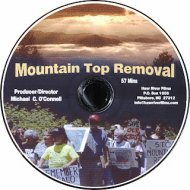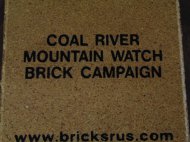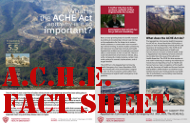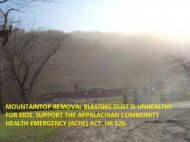
Citizen Action For Real Enforcement
Aug 26, 2013
The Need for Action
Citizens have a right to expect protection by their government. West Virginia is failing to protect its citizens from chronic pollution, environmental degradation, human suffering and costs resulting from inadequate regulation of coal extraction by state government. In the interest of citizens' health and wellbeing, legal recourse is required to hold the government accountable in its duty to protect the people of
West Virginia. Decades of citizen complaints have not resulted in acceptable responses or improvements to state government’s regulatory responsibilities on coal extraction, particularly around the devastating consequences of unenforced regulations for surface mining for West Virginia communities. A serious injustice is being done to West Virginia citizens by their own government, and all West Virginians
are affected by failures to enforce the law. Floods, polluted drinking water sources and other damages pose a threat to human health and put a serious drain on the state budget. Poor reclamation practices hinder future development. Mines that are not completely reclaimed including long-term water treatment represent a huge unfunded liability for the state budget.
A New Approach
The Surface Mining Control and Reclamation Act (SMCRA) allows for citizens to petition the federal Office of Surface Mining, Reclamation and Enforcement (OSM) to assume authority over a failed state agency. Eighteen civic, environmental and religious groups representing the public interest filed an administrative petition (“733 Petition”) in order to compel OSM to investigate the West Virginia Department
of Environmental Protection (DEP)’s mining program on June 24th, 2013. The intent of this action is to assure proper enforcement of mining laws. Under the law, OSM must investigate the allegations and, if they agree with the petition’s conclusions, order changes to the state program and/or take it over temporarily.
The OSM has used this authority 11 times in a total of nine states: Tennessee; Oklahoma in 1981, 1983 and 1993; Kansas in 1983; Montana in 1993; Utah in 1995; West Virginia in 2001; Missouri in 2003; Ohio in 2005; and Kentucky in 2012.
Our Campaign - CARE: Citizen Action for Real Enforcement
Many efforts have been made over the years to address this problem on a state level, but they have all failed to some degree. Large out-of-state coal companies have wielded overwhelming political influence over the state government for over 100 years. The entrenched political power of the coal industry in West Virginia gives citizens no choice but to appeal to the federal government for intervention.
It will take a concerted and sustained campaign for this petition to force meaningful changes in mining regulation in West Virginia. The campaign is bringing together a broad base of West Virginia public interest groups to provide political pressure on a state level and national allies to amplify our voice in Washington. We need you to join our CARE campaign.
CARE PARTNERS
Appalachian CatholicWorker, Appalachian Voices, Catholic Committee of Appalachia, Center for Biological Diversity, Center for Health, Environment and Justice, Christians for the Mountains, Coal River Mountain Watch, Earthjustice, Keeper of the Mountains Foundation, League of Women Voters of West Virginia, Mountain Heritage and Health Association, National Wildlife Federation, Ohio Valley Environmental Coalition, Sierra Club, West Virginia Citizen Action Group, West Virginia Environmental Council, West
Virginia Highlands Conservancy and West Virginia Rivers Coalition.
What's Wrong with the West Virginia DEP?
A Fundamentally Broken Regulatory Culture
The DEP has systemically failed to adequately enforce the law resulting in serious harm to communities including devastating floods and polluted water. Without strong government oversight the coal industry cutscorners and endangers communities. The responsibility for this lies squarely at the feet of our Governor. Strict enforcement of the law has been discouraged from the top down. Without the threat of meaningful
enforcement action, there is little incentive for companies to “get it right the first time.” Citizen participation was intended to be at the very heart of SMCRA when it was passed by Congress, but at the DEP citizen complaints and comments are often ignored, or worse, discouraged.
A look at where the DEP puts its money shows the problem. Between November 2010 and November 2012 the DEP spent nearly $1 million fighting the U.S. Environmental Protection Agency to protect the mining industry at the expense of public health and the environment. During this same period, DEP spent only $130,000 on a study on serious human health impacts resulting from coal mining in the community of Prenter, W.Va. Shockingly, DEP‘s study found that the water was not contaminated, despite substantial evidence of widespread contamination wreaking havoc on the health of local residents. Below are just a few of the many areas in which the DEP is failing to enforce the law and protect communities.
Flooding
The DEP refuses to use accurate science to enforce laws on flooding. An independent consulting firm, Bioengineering Group, found systematic errors in the DEP's method for determining the risk of flooding from surface mining. This has resulted in permits that do not adequately protect communities from flooding.
We’ve endured devastating flooding in counties throughout southern West Virginia, including floods in Fayette and Raleigh Counties in 2001, McDowell County in 2001 and 2002, and Mingo County in 2009.
Chronic Understaffing
From 2005 through 2011, the DEP's mining program has had dozens of unfilled positions. This has resulted in serious lapses in enforcement. Each inspector is responsible for over 16,000 acres and each year hundreds, and often thousands, of mandatory inspections of mine site are not performed, leading to numerous missed or uncorrected violations.
Inadequate fines and violations
Fines are typically too small to deter coal companies from breaking the law and stronger enforcement actions are rarely used. More than half of all fines issued are less than $1,000. One mine that received 57 violations in a 58 month period received just under $76,000 in fines with no greater penalties. Violations are often not issued at all. Mine sites across the state were found to have violated their limits on water pollution discharges for more than 36 months without a single violation issued under SMCRA.
Illegal Permitting
The DEP regularly issues and renews permits illegally. A DEP staff attorney admitted that the agency regularly illegally renews permits with ongoing water quality violations but defended the practice by claiming that following the law would “shut down mining.” Throughout the permitting process, the DEP bends or breaks the rules to make it easier to issue and renew permits.
To get involved in the CARE campaign, contact Coal River Mountain Watch at (304) 854-2182.













